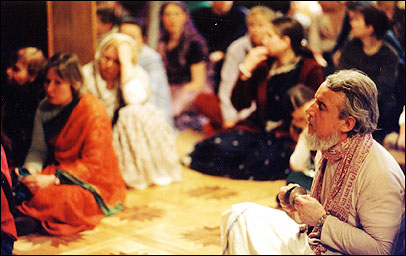
Ignorance is sometimes bliss
Hare Krishnas enjoy peace without a lot of prosperity
By DANIEL EVANS
 |
|
A devotee
sings praises in the Moscow Hare Krishna temple during the celebration
of Lord Chaitanya's birthday. |
After facing more than two decades of harassment, lynchings, fire bombings and official hatred, Hare Krishnas in Russia now have a different problem: getting noticed.
Their temple in Moscow is the largest in the country. Painted pink and orange and within sight of the Begovaya Metro station, it should be a stunning contrast to the surrounding Soviet-era concrete apartments and shops.
But the paint is faded and peeling, and the hundreds of commuters that daily pass the building rarely seem to give the unusual edifice a second look.
One recent afternoon, men and women breezed by a woman dressed in an orange and yellow sari, holding japa beads and chanting softly to herself.
"When you're out on the street in Russia, it's pretty obvious," said Shei Caitanya das, a devotee at the Moscow temple. "They either hate you or they think you're a saint. But that's only some people. For the most part, people don't seem to be interested one way or the other."
Attendance at Hare Krishna temples in the early 1990s surged to record levels - nearly 70,000 people attended services throughout the country. After the fall of Communism, Russians looked for something, anything, to fill the void left by Soviet-era atheism.
But now, Hare Krishnas count less than 15,000 members in Russia, and any attempts to win new members are met with resistance. The novelty of the religion has dropped off, and many people see Hare Krishnas as chanting, dancing, vegetarian oddities. They want no part.
Still, recruitment continues in different forms.
Zouev Sergei Vasilyevich, the communications director of the Moscow temple, said devotees there still go door-to-door in an attempt to win converts. As a result, devotees are occasionally yelled at and cursed, he said, but that's about it.
Officials at the Kazan temple said they don't even bother to advertise their prasadam - free vegetarian feasts usually given on Sundays - preferring to wait for people to come to them.
"We are not aggressive," said Vladimir Mihegev, one of a dozen devotees who live at the Kazan temple.
But just getting to the temple in Kazan, an Islamic enclave about 600 miles east of Moscow, takes devotion. Devotees must take a 45-minute bus ride to an unnamed suburb miles from the downtown bustle. Then they must trek an additional half-mile down a dirt trail and duck through a broken gate before arriving at the temple: a building which has been in a constant state of construction and disrepair since it opened a decade ago.
As a result, about a dozen people come to the services in Kazan, a city of more than a million people.
In Moscow, about 150 men and women, living separately, call the temple home. According to temple officials, an additional two to three thousand people occasionally come to the daily or Sunday services. Attendance for any one service, though, rarely exceeds more than 300 people.
Radha-Damodara das is the president of the Moscow temple. In his spacious, but sparsely furnished office, the smell of incense floats through the air. In one corner, a CD recording of ISKCON's founder, A.C. Bhaktivedanta Swami Prabhupada, chanting the Hare Krishna mantra plays over and over. At 41 minutes into the CD, the recording skips, creating an almost surreal echo of the repetitious mantra. None of the dozen or so people that float in and out of the office seem to notice.
Radha-Damodra das wears the saffron robes that indicate his rank of sannyasa, a celibate order. Saying haltingly that he does not speak English, he excuses himself. Soon after, Vasilyevich entered.
Vasilyevich, who has been married 17 years, wears the white robes indicative of this status. On top of the robes, he wears a grey sweatshirt to guard against the chill. Like Radha-Damodara das and most other male devotees at the temple, he sports a closely shaved head.
Vasilyevich, who was imprisoned from 1983 to 1985 for his beliefs, said things are fairly stable these days. The most difficult time, by far, occurred between 1980 and 1985, when less than 100 devotees inhabited what was then the USSR.
"We were seen by the KGB as being an American tradition. But it is clearly Vedic, Hindu. Now people see us in that way, and things are better," he said.
"I was one of the leaders of the Moscow temple at the time, and they put all of us in prison, in order to create fear in other persons," he said. "But such actions created more force for the movement in Russia. More energy. We have no fear."
Vasilyevich said it was curious that less people seem to be interested in the religion, since devotees are freer to express their faith now than probably any other time in Russian history. Still, he said he is not worried.
"People will come around," he said.
Shaimiev Mintimer Sharipovich, the president of the Kazan temple, is also unfazed by the drop in devotees. People simply have more options now, he said.
"More people
choose their paths more carefully now," he said. "Soon they
will see the truth."
QUICK
LINKS:
Feature
Stories | Dispatches
| Photo
Essays |
Itinerary
& Maps
|
About
This Class
A project of the Columbia University Graduate School of Journalism made possible by the Scripps Howard Foundation. Comments? E-mail us.
Copyright
© 2003 The Graduate School of Journalism at Columbia University.
All rights reserved. Reproduction in whole or in part without permission
is prohibited.





